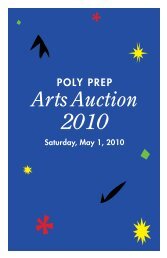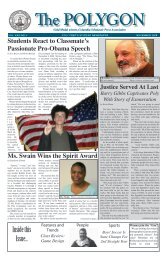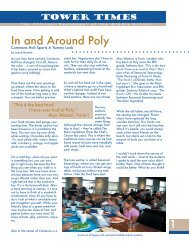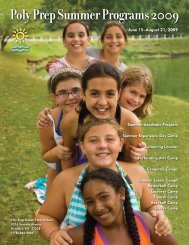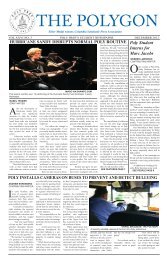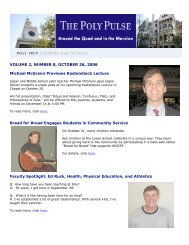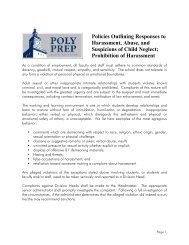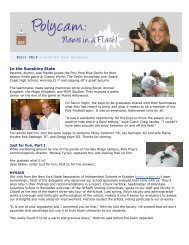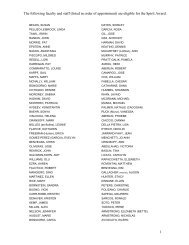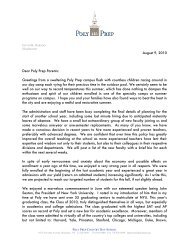You also want an ePaper? Increase the reach of your titles
YUMPU automatically turns print PDFs into web optimized ePapers that Google loves.
students, in two<br />
shifts of four hours<br />
each, 600 in the<br />
morning and 300 in<br />
the afternoon, and<br />
only forty teachers.<br />
In the afternoon<br />
session, there were<br />
two kids to a desk,<br />
but obviously in the<br />
morning it must be<br />
three. One classroom<br />
block is made<br />
of concrete, meager<br />
but tolerable. The<br />
older section of the<br />
school is wooden,<br />
with rickety wooden<br />
desks, and a lone<br />
blackboard. The students<br />
get a paperback<br />
textbook/workbook<br />
of about 100<br />
pages for the whole year’s work in any subject. I looked<br />
at the history text for the high school, and it’s pretty<br />
paltry. They have history only one hour a week in any<br />
case, geography another hour, so it’s hard to imagine<br />
how much they can actually cover. And it explains why<br />
the teachers keep saying, “Well, what you present is<br />
interesting, but we can’t do it.”<br />
issues. That was<br />
reasonably good.<br />
Then we discussed<br />
education issues,<br />
and they worked in<br />
five groups to prepare<br />
the persuasive<br />
essay on that topic.<br />
After they had done<br />
a first draft, they<br />
did peer editing,<br />
which I think was<br />
a very successful<br />
technique that they<br />
hadn’t been familiar<br />
with yet, and<br />
then we went to the<br />
teacher training<br />
institute library to<br />
do research, with<br />
Forsyth (right) speaks with author, lecturer, and human-rights activist Loung Ung, two students going<br />
who spoke at <strong>Poly</strong> in September to kick off the Cambodia Project.<br />
off by moto to an<br />
Internet café.<br />
The library has meager resources and is quite disorganized—obviously<br />
it’s not used much for research.<br />
Hong, my excellent interpreter, told me that they don’t<br />
do research in any case—it’s a foreign idea, and of course<br />
I can see why, as their resources are so few. But the<br />
teachers seemed engaged with what they did in the<br />
library for an hour or so. When each group had finished<br />
their final essays, they read them before the class, which<br />
then voted for which ones had the best arguments. I<br />
have no idea if they were any good at all, as time was<br />
short so I didn’t have Hong translate. I was pleased that<br />
the teams managed to finish their essays, which were<br />
then translated and put into the teachers’ notebook that<br />
is prepared at every TAB program for dissemination.<br />
Quite a few of my group told me they would use what they<br />
learned in my workshop in their classes, but who<br />
knows? If one or two people really got something out of<br />
it, then it was worthwhile. Next year, however, I’ll do<br />
real history stuff—a trial, a simulation, a debate. They<br />
were very sweet on the last day. Several gave me gifts,<br />
and one woman was nominated to make a farewell<br />
address. I actually got rather emotional and teary.<br />
Teaching in Battambang<br />
I had a nice class of 20, almost all of whom were there<br />
every day. Only one absence! Fourteen men, six women,<br />
about two-thirds history teachers and one-third Khmer<br />
literature (by which they mean, I think, any writing in<br />
Khmer), and a few miscellaneous others. I was presenting<br />
the five-paragraph persuasive essay that just about<br />
every American kid learns to do. They were quite resistant<br />
at first, saying that students could then argue for<br />
anything, but I think they understood that it wouldn’t<br />
necessarily lead to a defense of corruption or murder. I<br />
had them identify the chief issues facing Cambodia and<br />
then work in groups to prepare speeches on those<br />
SUMMER 2008 15



